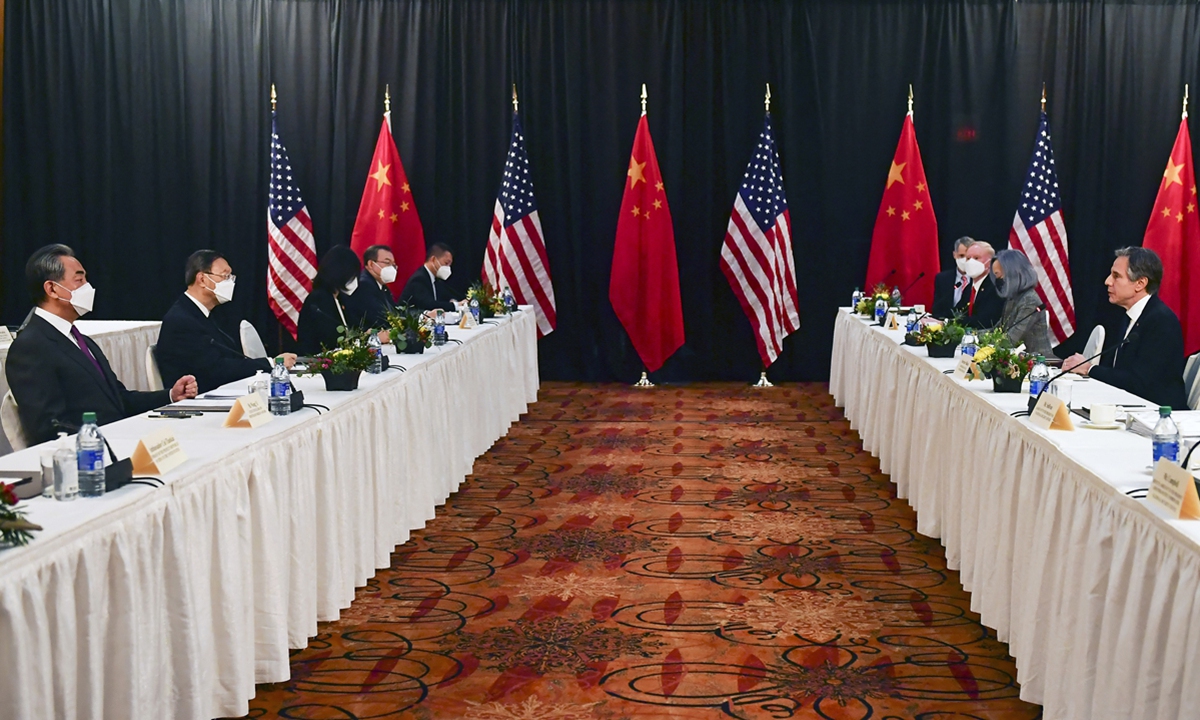
Photo: AFP
The China-US talks in Alaska are very likely to be given great importance in history. The talks are being held at an important time when China-US relations are at the crossroads, carrying a lot of weight. How should China and the US understand and deal with each other? Can the two countries get rid of the increasingly severe atmosphere of confrontation promoted by some forces in the US? The world is observing and digesting the information released from the talks.
The warm-up of the talks in Alaska has long begun. The US has released a series of tough words and deeds to put pressure on China. Such a gesture by Washington has lasted until the opening remarks of the talks. The US, in its public speech which went seriously overtime, carried out groundless attacks against China, especially mentioning many of Chinese internal affairs including Xinjiang and Hong Kong, trying to gain the upper hand.
Yang Jiechi, a member of the Political Bureau of the Communist Party of China (CPC) Central Committee and director of the Office of the Central Leading Group for Foreign Affairs, and Chinese State Councilor and Foreign Minister Wang Yi dealt with this calmly. Yang said that in front of the Chinese side, the US is not qualified to speak to China from a position of strength. And Wang said that "the old habit of US hegemonic behavior of willfully interfering in China's internal affairs must be changed."
This is an unprecedented open face-to-face confrontation between China and the US in recent decades. It has great impact, and is also a correction of the US' understanding and long-held attitude toward China. It tells Washington that the US should stop pretending that they can point a finger at China. That era is over. The US must deal with China in an equal and respectful way to resolve problems with China.
With China's rapid development, the power gap between China and the US has been narrowing, and the US feels a strategic crisis. China-US relations have been turbulent. Re-stabilizing the relations, and viewing each other equally with respect, especially respecting each other's core interests, are essential. Rules must be based on the UN systems and should not represent "America First." If this benchmark is not clarified, then everything will be distorted.
Washington has always twisted the facts. It has been bragging about its allies. As it undermines the rules, it is also blatantly promoting a so-called rules-based international order. Everything Washington talks about is centered on the US, and on white supremacy. The interests of the US and its few allies have become the starting point of right and wrong.
The Chinese delegation has made a historic move to set things right. Their statements have formed a strong refutation of that of the US, which has impacted on the US' stereotype and will make the international community think. The world's sense of right and wrong is not in Washington's hands. Changing Washington's thinking on China is not a simple matter and is destined to happen gradually, but talks in Alaska are likely to be regarded as a milestone in this process by history.
China still hopes to maintain normal relations with the US and develop mutually beneficial cooperation. This wish is also irreversible. After the fierce opening remarks, China and the US entered a closed-door substantive dialogue. The two countries have withstood the impact of confrontation at the opening, and the two countries' public opinions seem to have quickly adapted to the situation. We believe there are also positive signs in this.
China and the US are two major world powers. No matter how many disputes they have, the two countries should not impulsively break their relations. Coexistence and cooperation are the only options for China and the US. Whether we like it or not, the two countries should learn to patiently explore mutual compromises and pursue strategic win-win cooperation.
If the two countries are clear-headed, they will do this proactively. Whoever is stubborn will still have to do this passively. The 21st century will not give a second answer to China-US relations.




